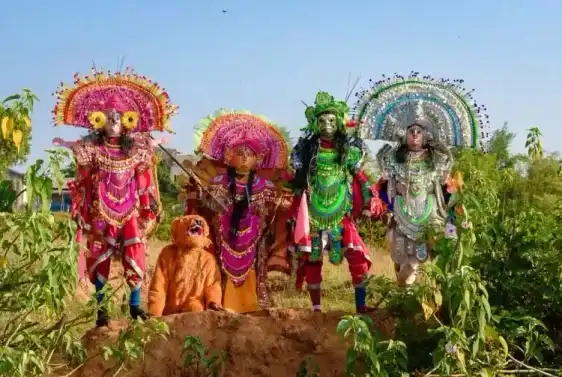Jharkhand: Land of Abundant Resources and Rich Heritage
Introduction
Jharkhand, a relatively young state in eastern India, is a land of diverse landscapes, rich cultural traditions, and a growing industrial presence. This comprehensive description, spanning approximately 2000-2500 words, delves into the demography, culture, science and technology, art and culture, geography, history, notable poets and authors, cuisine, business, medical facilities, and administrative structure of Jharkhand.
Demography
A mix of indigenous tribal communities, diverse languages, and unique cultural traditions marks Jharkhand's demographic profile. As of my last knowledge update in September 2021, the state had a population of approximately 38 million.
Tribal Communities
Jharkhand is home to a significant population of indigenous tribal communities, including the Santhal, Munda, Oraon, and Ho, each with its distinct culture and language.
Languages
While Hindi is the official language, various tribal languages and dialects are spoken throughout the state, preserving the cultural diversity.
Religions
The majority of the population practices Hinduism, but Jharkhand also has significant Christian, Muslim, and indigenous tribal religious communities.
Culture
Jharkhand's culture is a reflection of the deep-rooted traditions of its tribal communities and the influence of various external factors.
Tribal Traditions
The state's indigenous tribal communities have a rich tradition of art, music, dance, and oral storytelling that is integral to their way of life.
Festivals
Jharkhand celebrates a range of festivals, including Sarhul, Karma, and Tusu, which are marked by vibrant dances, traditional songs, and rituals.
Art and Culture
The state is known for its tribal art, with Warli and Sohrai paintings being prominent. Handicrafts like dokra (metal casting) and khovar painting are also cherished.
Science and Technology
Jharkhand has made progress in science and technology, particularly in the areas of mineral resources and agriculture.
Mineral Resources
The state is rich in mineral resources, especially coal, iron ore, and bauxite. The mining industry plays a crucial role in the state's economy.
Agriculture
Jharkhand has been focusing on modernizing its agricultural practices, including the use of technology for crop management and irrigation.
Geography
Jharkhand's geography is characterized by dense forests, hills, plateaus, and rivers, making it ecologically diverse.
Chotanagpur Plateau
The state is part of the Chotanagpur Plateau, known for its elevated terrain, lush greenery, and dense forests.
Forests
Jharkhand's forests are rich in biodiversity and house several wildlife sanctuaries, including Palamau Tiger Reserve and Betla National Park.
Rivers
The state is traversed by several rivers, including the Subarnarekha, Damodar, and Koel, which provide water for agriculture and industry.
History
Jharkhand's history is deeply rooted in the struggle for tribal rights, the fight against social injustices, and the quest for a separate state.
Tribal Uprisings
The region has a history of tribal uprisings against British colonialism and, later, against land exploitation by outsiders.
Formation of the State
Jharkhand was carved out of Bihar in the early 21st century and became a separate state on November 15, 2000.
Poet/Author
Jharkhand has a growing literary tradition, with poets and authors contributing significantly to regional and Indian literature.
Birsa Munda
Birsa Munda, a tribal freedom fighter and folk hero, is celebrated for his role in the tribal movement. His songs and verses continue to inspire generations.
Cuisine
Jharkhand's cuisine is simple and heavily influenced by the tribal way of life, with a focus on locally sourced ingredients.
Thekua
Thekua, a sweet dish made from wheat flour, jaggery, and ghee, is a popular treat, especially during Chhath Puja.
Litti Chokha
Litti Chokha, a traditional dish, consists of roasted wheat flour balls served with a mixture of roasted and mashed vegetables.
Business
Jharkhand's economy is largely based on agriculture, mining, and industrial development.
Mining
The state is a major producer of minerals, including coal, iron ore, and bauxite. The mining sector significantly contributes to the state's revenue.
Agriculture
Jharkhand's agriculture is predominantly rain-fed, with rice, maize, and pulses being the primary crops. The state government has initiated schemes to promote agricultural growth.
Industrial Growth
Jharkhand has seen industrial growth, particularly in sectors like steel, power, and automotive manufacturing. The state's industrial areas include Bokaro, Jamshedpur, and Ranchi.
Medical Facilities
Jharkhand has a healthcare system that comprises government and private medical facilities.
Government Healthcare
The state operates a network of government hospitals and health centres, including medical colleges and institutions like Rajendra Institute of Medical Sciences (RIMS) in Ranchi.
Private Healthcare
Private hospitals and clinics offer multi-specialty healthcare services and are available across the state.
Administrative Structure
Jharkhand is a separate state with a parliamentary system of governance
State Government
The state government is headed by the Chief Minister, who leads the elected government. The Governor is the constitutional head. The state government is responsible for various sectors, including education, health, and infrastructure.
Local Self-Government
Jharkhand follows the Panchayati Raj system, which includes village councils and municipal corporations for rural and urban governance. Local self-government institutions play a crucial role in grassroots administration.
Judiciary
The state is under the jurisdiction of the Jharkhand High Court, located in Ranchi. District courts, magistrate courts, and various tribunals handle legal matters at different levels.
Law Enforcement
Law and order in Jharkhand are maintained by the Jharkhand Police. The Director General of Police (DGP) is the highest-ranking officer overseeing the state police force. Specialized units address specific law enforcement needs.
In conclusion, Jharkhand, with its tribal heritage, lush landscapes, and evolving industrial landscape, is a region of great cultural significance and economic potential. The state's unique cultural traditions, literary contributions, and culinary delights make it a distinctive part of India. As Jharkhand continues to grow and embrace modernization while preserving its tribal heritage and natural beauty, it remains a region with a rich tapestry of history and culture that contributes to the diversity and dynamism of India.
